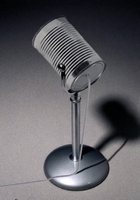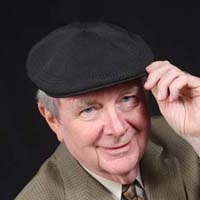| View previous topic :: View next topic |
| Author |
Message |
Kristin Lennox
Flight Attendant

Joined: 30 Apr 2011
Posts: 858
|
 Posted: Tue Jul 30, 2013 2:52 pm Post subject: Posted: Tue Jul 30, 2013 2:52 pm Post subject: |
 |
|
I have no idea what my noise floor is.
There. I said it.

_________________
Always look on the bright side of life.
Dee doo. Dee doot doot doo dee doo.
my website |
|
| Back to top |
|
 |
dwpthe3rd
Contributore Level V

Joined: 28 Feb 2010
Posts: 199
Location: Where palm trees meet pines
|
 Posted: Tue Jul 30, 2013 3:51 pm Post subject: Posted: Tue Jul 30, 2013 3:51 pm Post subject: |
 |
|
| dbeers wrote: |
Your mic gain is set where your usually record, with normal speech peaks hitting say -12db. Your noise floor in your booth is sitting at say, -65db room noise. But what if you start talking at a much louder, delivering peeks consistently at say -6db. You've not changed your pic amp level, and your room noise would still be at -65db. Thus using more head room, but not clipping. |
This I would interpret as "dynamic range". which to my thinking has no effect on noise floor, although upon raising voice level you have the option to lower mic gain 6db with a commensurate noise floor 6db lower. Been following this with interest and eager to see where it's going.
Dave |
|
| Back to top |
|
 |
dwpthe3rd
Contributore Level V

Joined: 28 Feb 2010
Posts: 199
Location: Where palm trees meet pines
|
 Posted: Tue Jul 30, 2013 3:53 pm Post subject: Posted: Tue Jul 30, 2013 3:53 pm Post subject: |
 |
|
| Kristin Lennox wrote: | I have no idea what my noise floor is.
There. I said it.
 |
Years ago with small kids I always thought my noise floor was when it was time to hollar "keep it down in there"! 
_________________
If attacked by a mob of clowns go for the juggler.
dwpthe3rd |
|
| Back to top |
|
 |
Ed Fisher
DC

Joined: 05 Sep 2012
Posts: 605
Location: East Coast, U.S.A.
|
 Posted: Tue Jul 30, 2013 7:25 pm Post subject: Posted: Tue Jul 30, 2013 7:25 pm Post subject: |
 |
|
| Benjamin Stovall wrote: |
Compression is something else entirely. Quieter levels are left untouched, while peaks are lowered to reduce dynamic range.
Limiting reduces the peaks, bringing up the overall volume.
|
Perhaps I'm mistaken, but I believe this is somewhat backwards.
Limiting reduces the peaks only. Quieter levels are not affected.
Compression reduces the dynamic range by BOTH pushing down the LOUD while at the same time pushing up the lower volume info.
Last edited by Ed Fisher on Tue Jul 30, 2013 7:58 pm; edited 1 time in total |
|
| Back to top |
|
 |
Bob Stevens
Contributore Level V

Joined: 27 Dec 2012
Posts: 151
Location: Orange County, California
|
 Posted: Tue Jul 30, 2013 7:45 pm Post subject: Posted: Tue Jul 30, 2013 7:45 pm Post subject: |
 |
|
I will quote Wiki....
Downward compression reduces loud sounds over a certain threshold while quiet sounds remain unaffected.
Upward compression increases the loudness of sounds below a threshold while leaving louder passages unchanged.
Both downward and upward compression reduce the dynamic range of an audio signal.
An expander performs the opposite function, increasing the dynamic range of the audio signal. Expanders are generally used to make quiet sounds even quieter by reducing the level of an audio signal that falls below a set threshold level.
Compression and limiting are not different in process but in degree and perceived effect. A limiter is a compressor with a high ratio and, generally, a fast attack time. Most engineers consider compression with ratio of 10:1 or more as limiting.
_________________
"Dialog is the painting on a canvas of silence" |
|
| Back to top |
|
 |
Kim Fuller
DC

Joined: 29 Jan 2011
Posts: 641
Location: Portlandish, Oregon
|
 Posted: Tue Jul 30, 2013 7:49 pm Post subject: Posted: Tue Jul 30, 2013 7:49 pm Post subject: |
 |
|
Kristin - so glad you said it. Because I was sure thinking it  |
|
| Back to top |
|
 |
Ed Fisher
DC

Joined: 05 Sep 2012
Posts: 605
Location: East Coast, U.S.A.
|
 Posted: Tue Jul 30, 2013 8:09 pm Post subject: Posted: Tue Jul 30, 2013 8:09 pm Post subject: |
 |
|
I agree that "downward compression" and "limiting" are basically the same thing. I've just never thought of compression as being in only one direction. Every compressor I've ever owned did both at the same time. (which is why we called them "compressors" and not "limiters.")  |
|
| Back to top |
|
 |
Benjamin Stovall
Been Here Awhile

Joined: 13 Dec 2011
Posts: 250
Location: Los Angeles, CA
|
 Posted: Tue Jul 30, 2013 8:23 pm Post subject: Posted: Tue Jul 30, 2013 8:23 pm Post subject: |
 |
|
@Clutter Ash
I think it's a fair point to say that a limiter by default does not raise volume. To clarify, I should say that a limiter allows us to increase the loudness of the audio while maintaining a target peak level. The topic was about increasing volume, so I referenced it with that purpose in mind.
As far as compression goes, specifically downward compression as Bob was thoughtful enough to point out, the quiet levels are not affected. Of course, one could argue that "make-up gain" could be used, etc. There are a lot of misunderstandings about this. Just take a look at this thread over at Gearslutz and pop some corn: compressors do not make quiet sounds louder: true or false?
As an aside, The School of Audio Engineering has a great reference regarding limiters/compressors/expanders, etc. that can be found here:
http://www.sae.edu/reference_material/audio/pages/Compression.htm
Thanks,
Ben
EDIT: It's probably just a matter of time before someone checks me on the proper usage of volume vs. loudness. 
_________________
Ben Stovall Voiceover
http://www.benstovall.com
"When you're nearing the end of your rope, tie a knot. Keep on hanging. Keep on remembering, that there ain't nobody bad like you." -- The Electrifying Mojo
Last edited by Benjamin Stovall on Wed Jul 31, 2013 12:18 am; edited 2 times in total |
|
| Back to top |
|
 |
vkuehn
DC

Joined: 24 Apr 2013
Posts: 688
Location: Vernon now calls Wisconsin home
|
 Posted: Tue Jul 30, 2013 8:56 pm Post subject: Posted: Tue Jul 30, 2013 8:56 pm Post subject: |
 |
|
At times this conversation is frustrating, at times this conversation is amazingly amusing. Part of our challenge is that we cover a wide age span, and we became attached to the technical side of audio technology at different times in history.
I began working in radio BEFORE the transistor was in the marketplace. We had limiters and they were tube based devices. We had the schematics and you could read the instructions, take a V-O-M meter and see before your very eyes what was going on in the circuits and how the process worked. Just after I got started the first compressors (tube based) began showing up. In that era there was no terminology that I ever came across where people tried to talk about DOWNWARD compression as opposed to some other kind of compression.
Today's software based computerized versions of limiters and compressors and whatever else we call them are labeled as though they work just like the old discreet circuit hardware. Little graphic knobs are labeled dB (plus and minus), milliseconds, etc. They pretend to do what the old tube equipment did, but I must tell you that it took me 5 or 6 years to finally get where I could trick those electronic pretend knobs to do for me what the old mechanical knobs did.
For the life of me I cannot comprehend what the term UPWARD COMPRESSION means. In my feeble brain, compression is compression. It has no downward, no upward, no sideways. It's just compressed/mashed sound.
Some of you younger folks who have grown up with today's computerized audio processors get what you want out of them because you are not haunted by this "ghost of recording sessions past" and the language of the past.
Here is an amusing related situation. I'm also a bit of a photography nut. I used to have a home darkroom with trays and developer chemicals and an enlarger. We dealt in exposure, contrast, hard and soft paper, etc. When I go into photo editing discussion boards, you sometimes find this same conversation. Adobe Photoshop gives you controls to control all kinds of attributes of a photographic image and they are labeled with names to indicate that changing a control in Photoshop will do the same thing you used to do in the dark room. But some "deep thinkers" who say they have a lot of technical skills make a lot of arguments that when when adjust the CONTRAST in Photoshop, you are really getting some other change that creates a pseudo-contrast change! (Do I, Should I... care if it is pseudo or real? Only if I don't get the result I wanted and I have to learn to lie to my software to get what I really want.)
Welcome to technology of the 21st century. All of this rambling to say that we all need to have some patience with this thread. We are all using words that sound like we all speak the same language, but in some technical areas, we aren't. Be patient as we work out our language kinks.
Now, if you will excuse me, I need to go "fluff up" my hard drive. |
|
| Back to top |
|
 |
georgethetech
The Gates of Troy

Joined: 18 Mar 2007
Posts: 1878
Location: Topanga, CA
|
 Posted: Wed Jul 31, 2013 1:22 am Post subject: Posted: Wed Jul 31, 2013 1:22 am Post subject: |
 |
|
I only use peak values when measuring noise floor/dynamic range.
Compressors/limiters only raise perceived volume when the RMS increases after makeup gain is applied. However, in the case of many digital limiters, the makeup gain is built-in, such as in "Maximizers", with the ability to set the maximum level, as in normalization.
Compressors ALWAYS raise noise floor if you use make-up gain.
That said, I've heard two files that sound drastically different in terms of noise, but read nearly the same on the meters. Obviously, not all noise is created equal.
If it sounds good, then it is good.
_________________
If it sounds good, it is good.
George Whittam
GeorgeThe.Tech
424-226-8528
VOBS.TV Co-host
TheProAudioSuite.com Co-host
TriBooth.com Co-founder |
|
| Back to top |
|
 |
Philip Banks
Je Ne Sais Quoi

Joined: 20 Jun 2005
Posts: 11082
Location: Portgordon, Scotland
|
 Posted: Wed Jul 31, 2013 2:51 am Post subject: Posted: Wed Jul 31, 2013 2:51 am Post subject: |
 |
|
| From the top 7ft 2in. |
|
| Back to top |
|
 |
Rob Ellis
M&M

Joined: 01 Aug 2006
Posts: 2385
Location: Detroit
|
 Posted: Wed Jul 31, 2013 5:27 am Post subject: Posted: Wed Jul 31, 2013 5:27 am Post subject: |
 |
|
okay but what is that in dbs?  |
|
| Back to top |
|
 |
Rob Ellis
M&M

Joined: 01 Aug 2006
Posts: 2385
Location: Detroit
|
 Posted: Wed Jul 31, 2013 5:30 am Post subject: Posted: Wed Jul 31, 2013 5:30 am Post subject: |
 |
|
| Quote: | | I have no idea what my noise floor is. |
Kristin you will NEVER become a gear geek with that kind of attitude |
|
| Back to top |
|
 |
Philip Banks
Je Ne Sais Quoi

Joined: 20 Jun 2005
Posts: 11082
Location: Portgordon, Scotland
|
 Posted: Wed Jul 31, 2013 5:55 am Post subject: Posted: Wed Jul 31, 2013 5:55 am Post subject: |
 |
|
| Would 7ft 2in from the top equate to 11? |
|
| Back to top |
|
 |
ballenberg
Lucky 700
Joined: 10 Nov 2004
Posts: 793
Location: United States
|
 Posted: Wed Jul 31, 2013 6:08 am Post subject: Posted: Wed Jul 31, 2013 6:08 am Post subject: |
 |
|
George said:
| Quote: | That said, I've heard two files that sound drastically different in terms of noise, but read nearly the same on the meters. Obviously, not all noise is created equal.
If it sounds good, then it is good.
|
Wait--you mean George, who is The Man on all things technical, agrees with my simple theory noted earlier in this thread ?
I love it  |
|
| Back to top |
|
 |
|






